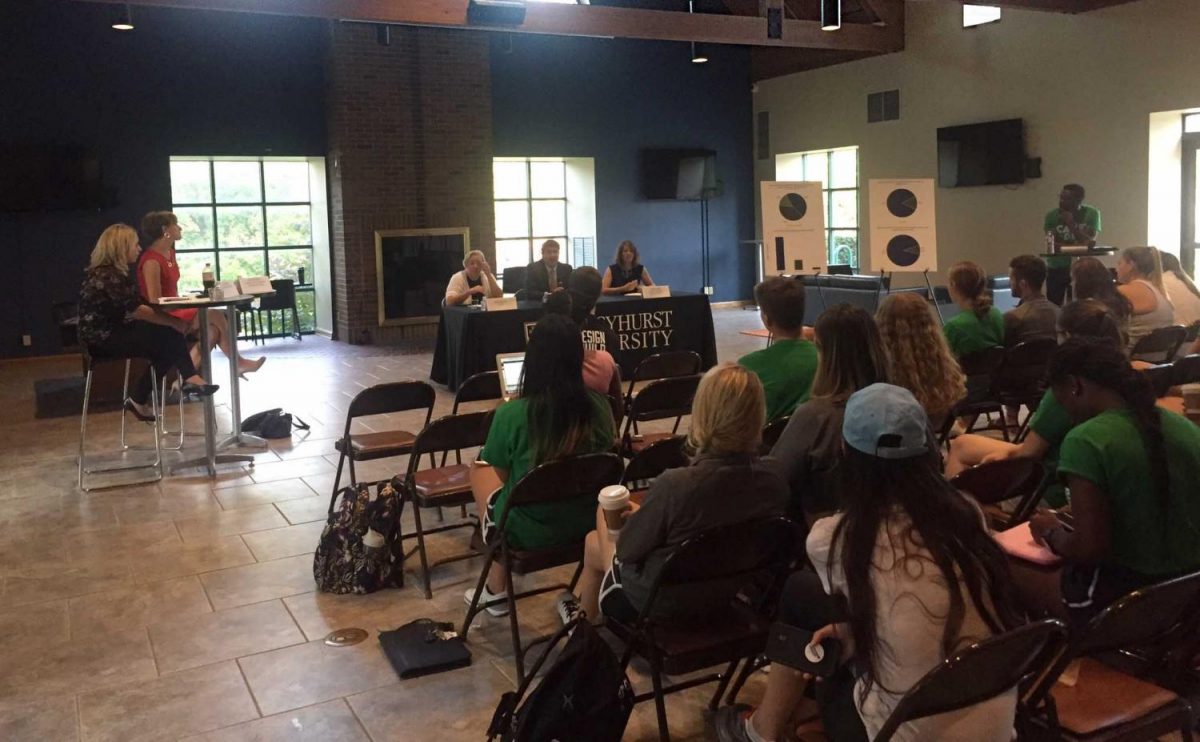MSG Fall forum discusses standardizing grading scale
October 3, 2017
On Sept. 25, in the Student Union Great Room, a panel of faculty members gathered to discuss potential changes in the university’s grading system.
After a survey held by Mercyhurst Student Government (MSG) yielded striking results that a majority of Mercyhurst students are in favor of changing the current grading scale to a more standardized scale, MSG decided to host a forum at which student voices could be heard about this topic.
Mercyhurst currently does not have a common grading scale, which means that each individual professor has the freedom to choose the grading scale for each of their classes. This means that many classes and subject areas vary in what makes an A, B, C or D, even for classes taught by the same professor.
The forum was open to all members of the Mercyhurst community as proponents of both sides of the issues made their opinions heard. The faculty panel consisted of David Dausey, Ph.D., provost and executive vice president; Dyan Jones, Ph.D., vice president of institutional effectiveness; registrar Michele Wheaton; Amy Parente, Ph.D., assistant professor of chemistry; and Amy Doolan, Ph.D., associate professor and associate dean, Walker School of Business.
“The students are part of our intergovernmental springboard,” said Dausey. “Therefore, having data to support what the students desire along with my personal opinion, is very helpful for us.”
The faculty recently decided not to advance the idea of the standardization because they believe it imposes on their intellectual freedom and discretion in the classroom to grade it to their personal judgment.
Dausey responded to questions on why Mercyhurst does not already have a standardized grading scale in place.
“We have to keep our mind on the outcome that we want first,” said Dausey. “It has always traditionally been viewed as something that related to the academic freedom of the faculty and their discretion of how they want to grade the class and to the fact that the grades of the class will still be the same.”
However, the students still want to further their case for a common scale among classes because they feel that it is easier to understand and more fair from subject to subject to have all letter grades correspond to one scale.
One potential solution for the issue would be standardization among departments, giving students in these majors a clearer sense of what is expected for each evaluation.
“The Walker School is pretty close to being standard,” said Doolan.
The main clarification that the faculty wish to give the students is that the standardization of a grading scale will not influence the difficulty of the class, nor will it affect the effort or conceptual understanding needed to receive an A, whether the scale is 93-100 or 90-100 across the board. Grade inflation could become a problem as it becomes harder to define an “A student” with a more common system.
Students are concerned that different scales will affect their GPAs and therefore affect their chances at more appealing résumés for jobs and graduate school. However, most future employers today are looking at consistency of grades, experience and letters of recommendation.
The results of an initial survey for students showed overwhelming support of standardizing the grading scale. Jones offered her help to MSG in creating a more detailed, robust and unbiased survey for pursuing the issue in the future.
“If you want to make your point, you need to have really really strong data to make that point,” said Jones. “If you do want to have a voice, I’ll help you make that case in the strongest way possible.”
A more clear survey will give the Mercyhurst community a better idea of why the students feel this way and what possible solutions may be.
“The more data you have to make an informed decision, the better,” said Parente. “You want to make sure you are making the best decision and what the consequences of making those changes might be.”
Another misconception with the change in grading scale is that this change will affect the plus/minus system of Mercyhurst. Mercyhurst currently uses “pluses” to denote higher numerical scores on grades, but they do not have a minus to counterbalance this system. Many students are in favor of adding the minus to the system. Though some faculty are in favor as well, they advised that it may alter current student GPAs and will take at least one school year to implement.
With any changes that will be made, the faculty made it clear that they only want to look at what is best for the student body as a whole, so as not to hurt an individual student or their academic career.
After discussion of the grading scale and the possible initiation of a plus/minus system, the floor was opened to general questions. The faculty panel answered various student questions on the new cyber security area, Self Service 4-year planning programs, class registration, internships and campus housing issues.
MSG typically hosts a fall and spring semester forum, but this one was held specifically to discuss opinions on the grading scale. MSG President Jonah Jackson saw this forum as well attended and successful, but encouraged more students to come to the forums or MSG meetings if they have issues or ideas for the administration.
“This forum was a great way to get the discussion going,” said Jackson. “If you want to voice your concerns, forums are a great place to do so. This is where things are changed.”


